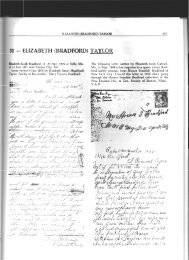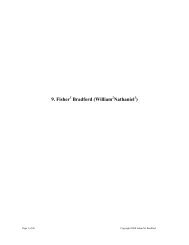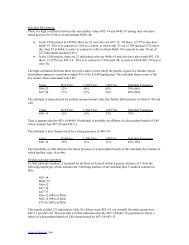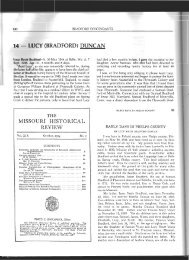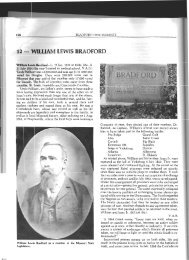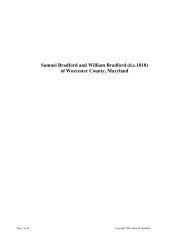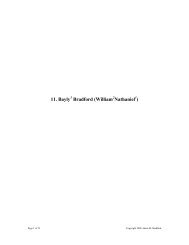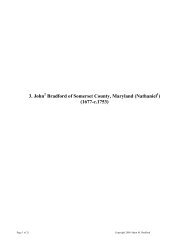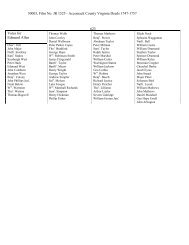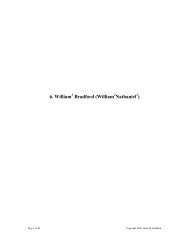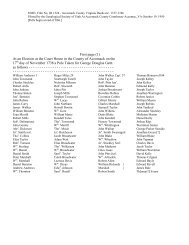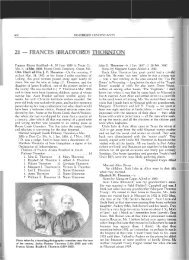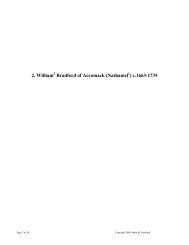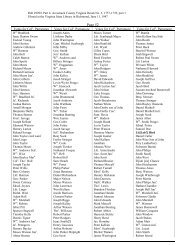1. Nathaniel Bradford of Accomack County, Virginia - Lower ...
1. Nathaniel Bradford of Accomack County, Virginia - Lower ...
1. Nathaniel Bradford of Accomack County, Virginia - Lower ...
You also want an ePaper? Increase the reach of your titles
YUMPU automatically turns print PDFs into web optimized ePapers that Google loves.
From Colonel Scarburgh’s first complaint, it is apparent that, regardless <strong>of</strong> activities carried out for their<br />
own pr<strong>of</strong>it, the local currier was obliged by law to “curry all hides brought to him” during certain periods<br />
<strong>of</strong> the year. One guesses that <strong>Nathaniel</strong> looked to the needs <strong>of</strong> his own operation before tending to other<br />
men’s hides, and that this may be a cause for Scarburgh’s first petition. By 1669, <strong>Nathaniel</strong> appears to have<br />
been no longer employed by Colonel Scarburgh as a currier, since in January <strong>of</strong> that year Scarburgh lodged<br />
a complaint against a Martin Moore, currier, for failing to supply him with curried hides as stipulated by an<br />
earlier agreement between them. 69 In 1668, Scarburgh is known to have been Moore’s master as well as the<br />
master <strong>of</strong> the tanner John Parker, probably the same John Parker who was sent to inspect <strong>Nathaniel</strong>’s<br />
leather after the second <strong>of</strong> Scarburgh’s complaints. Thus it appears that by 1669 Scarburgh had a currier<br />
servant on his plantation, and no longer had to rely on <strong>Nathaniel</strong>’s services. Perhaps by this time <strong>Nathaniel</strong><br />
himself was already beginning to set himself up as a shoe manufacturer, as we know must have occurred at<br />
some point due to the existence <strong>of</strong> a shoemaker’s shop on his plantation. It’s tempting to infer from the<br />
complaints <strong>of</strong> Scarburgh that <strong>Nathaniel</strong> was engaged in shoe manufacture even at this early date, and that,<br />
being a competitor <strong>of</strong> Scarburgh’s, <strong>Nathaniel</strong> might have been less than generous when it came to both the<br />
number and the quality <strong>of</strong> hides he supplied to others.<br />
* * * * *<br />
Colonel Edmund Scarburgh<br />
Colonel Edmund Scarburgh has been mentioned several times already in the course <strong>of</strong> this biography.<br />
<strong>Nathaniel</strong> <strong>Bradford</strong> is sometimes associated with him in what would seem to be something <strong>of</strong> a client<br />
relationship: Scarburgh assigned <strong>Nathaniel</strong> the patent for a portion <strong>of</strong> his plantation at <strong>Bradford</strong>’s Neck and<br />
is described as <strong>Nathaniel</strong>’s “Imployer” in his complaint against <strong>Nathaniel</strong> for his delinquency in currying.<br />
Furthermore, <strong>Nathaniel</strong>’s service as constable came during the same year Scarburgh was sheriff, and it is<br />
likely that Scarburgh had the pick <strong>of</strong> those who served under him, since he also served on the county<br />
commission which chose the constables. All the same, such frequent association with Scarburgh in<br />
<strong>Nathaniel</strong>’s early years might not be quite as notable as it appears. Scarburgh was ubiquitous on the eastern<br />
shore and especially in <strong>Accomack</strong> <strong>County</strong>. By all accounts, he was a powerful figure and easily the<br />
county’s most famous and controversial early resident. His family was also extremely well connected, his<br />
brother Henry being the court physician to King Charles II. Given that both Scarburgh and Stephen<br />
Charlton have appeared several times already in <strong>Nathaniel</strong>’s life and that Scarburgh will appear again<br />
several other times in this biography - this seems like a good opportunity to give a brief sketch <strong>of</strong> the some<br />
<strong>of</strong> the history <strong>of</strong> the time, both the history <strong>of</strong> the wider English world and also the history <strong>of</strong> <strong>Virginia</strong> and<br />
particularly the eastern shore, in which both Charlton and Scarburgh were involved as prime movers. The<br />
digression is warranted, since the events to be described constitute the historical context <strong>of</strong> <strong>Nathaniel</strong>’s<br />
early life.<br />
* * * * *<br />
Historical Backdrop<br />
The English Civil Wars<br />
<strong>Nathaniel</strong>’s early life, whether spent on the eastern shore or elsewhere, was coterminous with momentous<br />
events happening in England, events which did not fail to have an effect on <strong>Virginia</strong>, far away though the<br />
colony may have been from the scene <strong>of</strong> the action. Wherever it was spent, <strong>Nathaniel</strong>’s youth should be<br />
imagined as occurring against the backdrop <strong>of</strong> the English Civil Wars and the events that surrounded them.<br />
The English Civil Wars <strong>of</strong> the 1640s began as a struggle between Parliament and King Charles I over<br />
control <strong>of</strong> the kingdom’s finances. Charles had been soundly beaten by Scotland during his invasion <strong>of</strong> that<br />
country in 1640, and as a result the victorious Scots took military control <strong>of</strong> a large portion <strong>of</strong> north<br />
England and required Charles to pay for the support <strong>of</strong> the Scottish troops there. In need <strong>of</strong> money, Charles<br />
found himself forced to summon Parliament to request funds. As soon as Parliament sat in 1640 it<br />
immediately made attempts to assert its authority, impeaching and executing the King’s chief advisor and<br />
demanding that Parliament meet on a regular basis rather than at the King’s whim. The King did his best to<br />
resist these demands and matters came to a head in late 1641, when Parliament passed the Grand<br />
Remonstrance, a list <strong>of</strong> all their grievances against the King, in which they also demanded the power to<br />
Page 16 <strong>of</strong> 74 Copyright 2008 Adam M. <strong>Bradford</strong>



